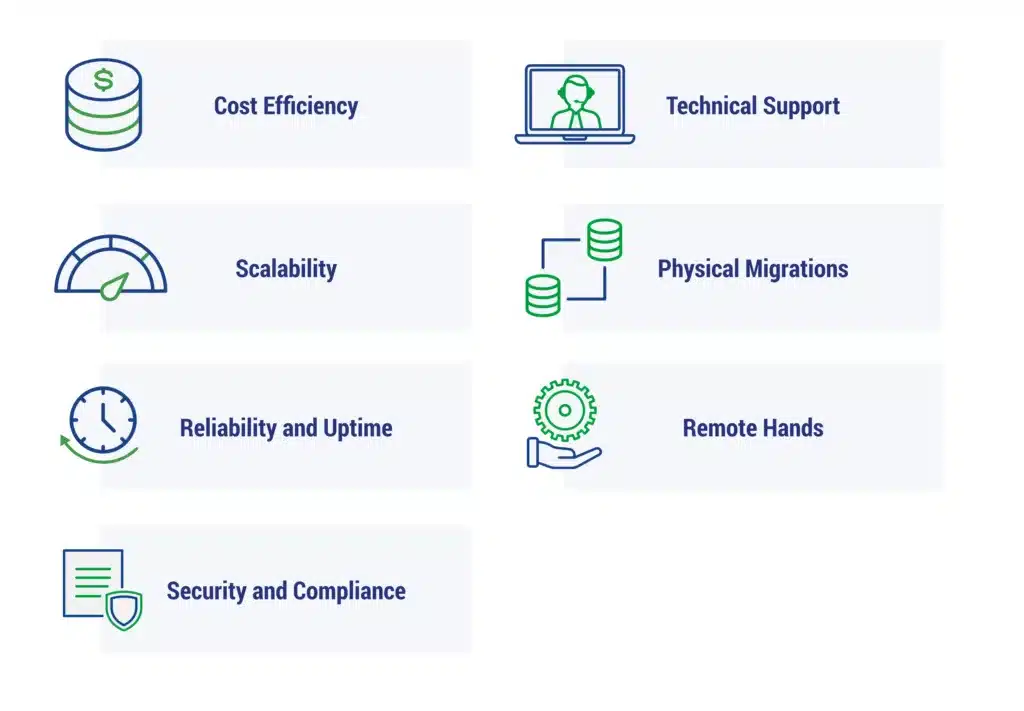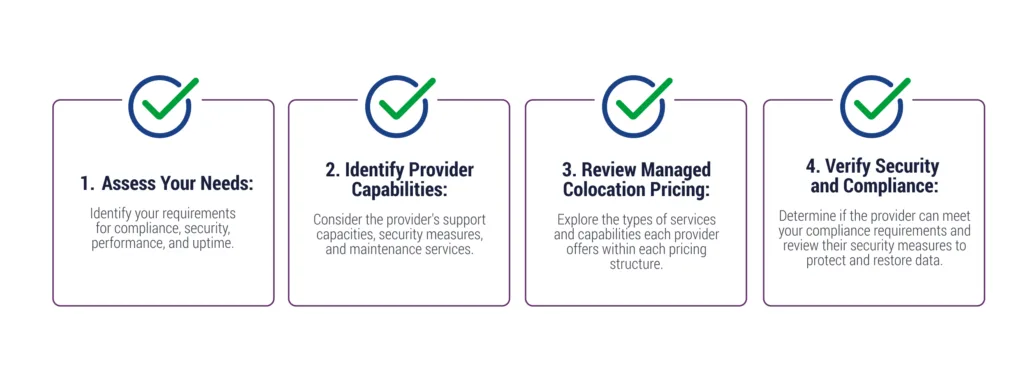
Does the concept of running your own data center feel daunting, or just expensive? Are you suffering from growing pains in your current on-premises data center? If so, you might benefit from managed colocation, a service that allows you to move your equipment to a data center, relying on facility experts to take care of the rest.
We’ll cover what you need to know about managed colocation, your service level options, and how to evaluate a provider before making a decision.
What is Managed Colocation?
Organizations that choose managed colocation essentially rent space in a colocation facility. In these cases the colocation provider takes on the responsibility of managing and maintaining the critical infrastructure such as power, cooling, and connectivity. Some colocation providers also offer additional services such as managed cloud, storage, network, monitoring, and security.
Why Choose Managed Colocation?
With the colocation market expected to grow to $43 billion by 2027, many are moving away from traditional on-premises to colocation – but why choose managed colocation?
First off, managed colocation can truly be the best of both worlds for businesses looking to get the benefits from traditional colocation and receive added value from managed services. It can be a great solution for businesses that lack the in-house resources to manage the uptime and security of their critical systems. It’s also a viable option for organizations that can’t afford to build an on-premises data center.
Benefits of Managed Colocation
Businesses looking for additional support provided by managed colocation can benefit from the highly scalable, cost-efficient, reliable, and secure offerings of the service.

Cost Efficiency
By taking over the management of your network infrastructure, managed colocation can reduce your IT costs associated with the 24×7 management of your environment and give your IT staff more time to focus on improving internal processes, developing new applications, or other strategic, revenue-building efforts.
Scalability
In an on-premises data center, if you outgrow your environment, you may have to expand the footprint or move to another facility. You might also run the risk of buying or building more than you need. Businesses that choose managed colocation share infrastructure and space with other organizations, which allows scalability to upsize or downsize based on needs with fewer overhead costs.
Reliability and Uptime
Downtime can be costly, even if it’s only for an hour. Some businesses cannot afford to lose any time from down systems. Managed colocation data centers often provide SLAs of 100% uptime, offering better resiliency, less latency, and enhanced security for their clients, their critical systems, and workloads.
Security and Compliance
Most managed colocation providers are built to handle equipment failures, natural disasters, power outages, and cyberattacks. Outsourced teams are also well-versed in the latest security measures and are aware of common vulnerabilities and threats to your IT environment, making them better equipped to handle incoming security incidents. Providers can also help you comply with any necessary industry regulations, including PCI DSS and HIPAA, which can save you money and time from otherwise costly penalties and fees.
Technical Support
Staffing a data center with 24-hour support can be a lot to manage and hard on budgets. Because managed colocation allows you to share space, you also have access to a 24/7 support team without paying for dedicated staff. Should an outage or other technical issue occur, the managed colocation provider will always have someone on hand to help.
Physical Migrations
Businesses often find physical migrations to be a daunting task. The transition from an on-premises location to a managed colocation provider requires dealing with numerous complex aspects. To simplify the process and ensure a smooth experience, many businesses opt to collaborate with a colocation provider that offers essential mappings and handles the actual move activities. This seamless assistance makes the migration less overwhelming and more manageable for the business.
Remote Hands
No matter where you are, you’re able to interact with your systems aided by managed colocation. This service offered by most, if not all, colocation providers also offers onsite technical support for monitoring and troubleshooting equipment and systems as well as daily maintenance and management. Remote hands services can save time otherwise spent driving to and from a data center to check on everyday concerns.
Choosing the Right Managed Colocation Expert for Your Needs
When you’re on the hunt for a managed colocation partner, make sure you go through the following process using this checklist:

- Assess Your Needs: While colocation providers share a lot of the same characteristics, they will each have a unique mix of services and features. Consider your requirements for compliance, security, performance, and uptime.
- Identify Provider Capabilities: Using what you know about your requirements, start to evaluate potential colocation providers based on their capabilities. Support capacities, security measures, and maintenance services may all factor into your decision.
- Review Managed Colocation Pricing: Gather quotes from more than one provider before settling on one. Pricing can vary depending on the provider and the types of services and capabilities they offer.
- Verify Security and Compliance: What regulations does your organization need to follow, and does the colocation provider meet the necessary requirements? Learn more about the security measures and protocols the provider has in place to protect and restore your data.
During the deliberation process, you may also want to interview the provider and ask key questions, as well as gather more information from current customers or review websites.
Making the Transition to Managed Colocation?
Whether you’re looking to maintain your own servers and equipment or transition to a managed solution, TierPoint can help you manage your IT infrastructure. Our expertise in IT security, networking, cloud services, and disaster recovery and 40 state-of-the-art facilities across the U.S. makes us the ideal partner for a business looking to outsource some of its systems and reduce the risk and burden associated with running a data center.
Interested in learning more about data center colocation? Read our strategic guide or schedule a tour of a world-class data center today.
FAQs
Colocation can be offered alongside managed services, so businesses do not have to choose between one or the other. For example, managed colocation allows an organization to move its IT environment to a colocation facility but leave the management to a provider.
A data center is the physical building where IT infrastructure is housed. Data centers can be run by one company or shared by many. A colocation facility allows businesses to rent space in a data center, but they bring their own equipment.

